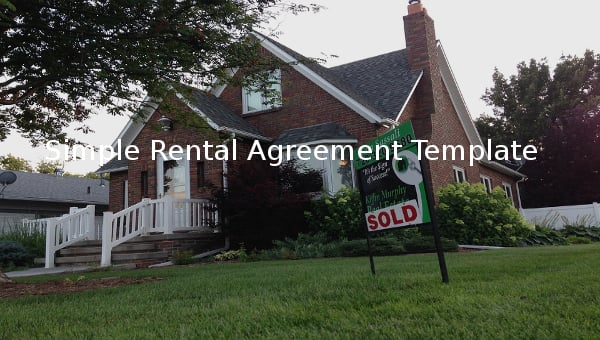
44+ Simple Rental Agreement Templates – PDF, Word
Legally mandatory documents that are required to be signed by both the parties are the simple rental agreement templates. These…
Type your text and let AI instantly create a fully editable docs, designs, forms, charts, diagrams, and more.
Jul 13, 2023
Every property of a person is of utmost importance. The daily operations of whatever property must be managed properly. In doing this, the property owner must hire a team of property managers to do the task. This team represents your property as you allow them to manage its operations. But before everything is said and done, you must come up with a property management agreement samples that is useful for this kind of situation. You may also like management agreement templates.

A property management agreement puts into detail the task and responsibilities that property managers are accountable for. The tasks will differ depending on the type of property being managed. Business owners and landlords usually hire them to manage the property. This agreement brings into writing the amount of money the management team is paid and the terms of the contract.


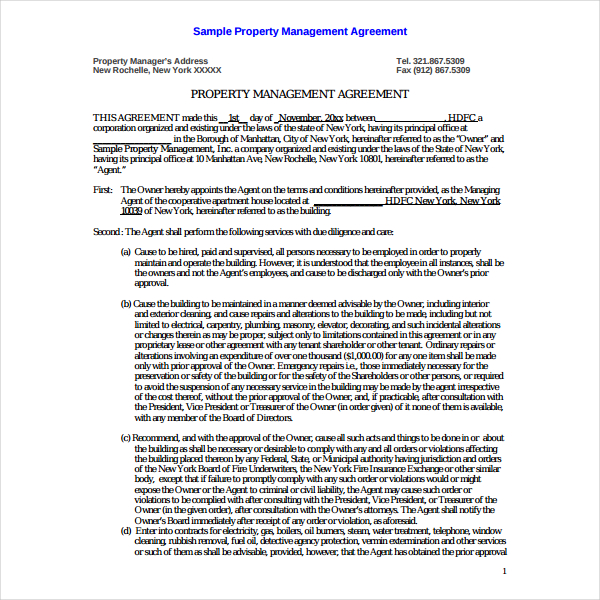
uhab.org
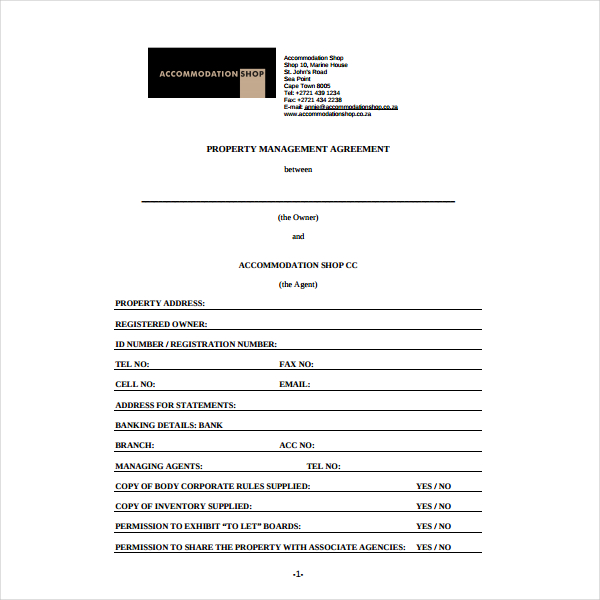
accommodationshop.co.za

harrisrealestate.com.au
All agreements must have the essentials that both parties would agree upon. It has to be fair on both sides and should be paid close attention to at all times.
There are things a property manager can and cannot do. These are listed in the services area. Most property managers charge for the services they do. They have a broken down list on the amount of money they charge for every service. Read the agreement and see how they price their services. They also do some extra services for the property. Some managers charge lower fees for their services but add more charges to their extra services. They also agree to not perform some services related to property managing. Understand this part well since it’s very important.
The agreement should state how long the contract is good for. Some last a few years while some contracts span decades before it expires. Some companies don’t sign a contract that lasts only less than a year. It takes confidence and assurance before a contract gets signed, no matter its duration. You may also like construction agreement templates.
The contract also details the owner’s responsibilities. The owner is not responsible for finding tenants to occupy his property as it is the job of the property manager. He is also barred from entering the property without the consent of the tenant. One of the responsibilities of the owner is setting up a reserve fund for the manager to use in case of emergency and other financial matters. The fund can also be used for daily operations and maintenance. Another is that owners are responsible for getting and maintaining insurance for the property. The agreement has to be specific in the coverage of the insurance that must be obtained. You may also like free rental agreements.
This part of the agreement protects the property manager unless in cases of negligence. It decreases his liability in case of damage. However, the property manager is responsible for the damage to the property brought by the third party that he hired. You may also like printable agreement forms.
Make sure the contract has a clear termination agreement. There is usually a 30 to 90-days prior notice before the termination. This part should state when the landlord and the property manager would terminate the contract. When things don’t work out like the way you planned, it would be better to end things. Fees will be paid if the contract is terminated early. Obligations after contract termination include giving the owner copies of tenant’s leases within 14 days and paying either party of the money owed within 30 days of contract termination.
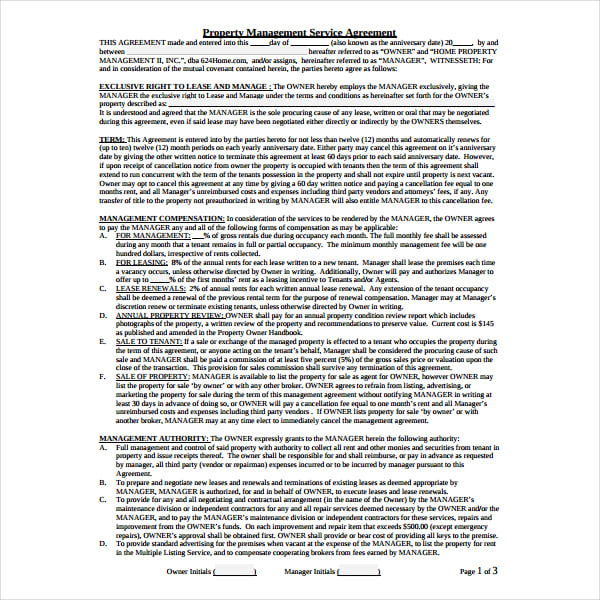
homepropertymanagement.com
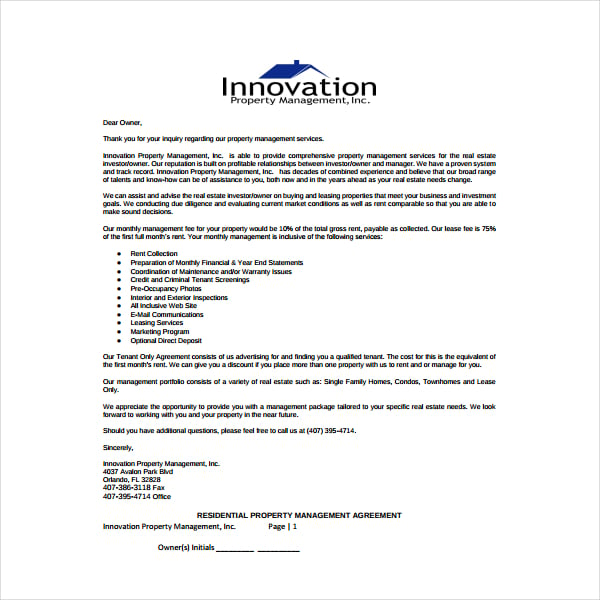
innovationrentals.com
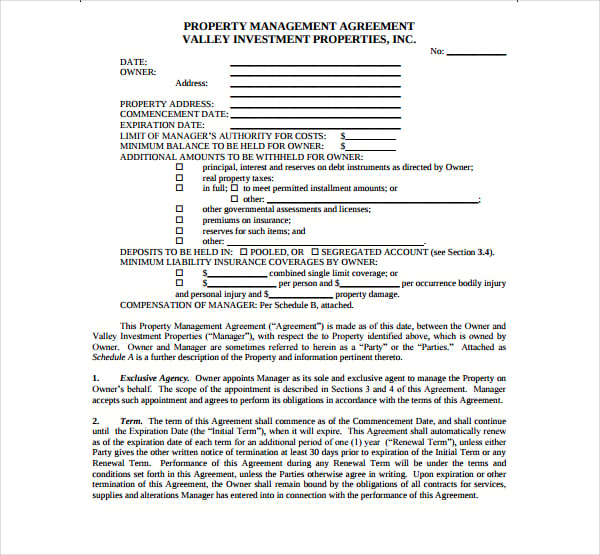
valleyinvestmentproperties.org
A property manager does many other things aside from managing the property. They juggle the daily operations for the property and other matters related to it. Here are some of the things a property manager does.
Property managers are tasked to handle the matters related to rent. They need to set the rent with a certain amount to attract tenants to rent the property. In setting the rent for the property, these managers need to study the market and make comparisons with other properties for rent around the area. They are also tasked to collect and adjust rent depending on the situation and on the law. There should be strict enforcing when it comes to late fees and a date for collecting the rent. You may also like short-term rental agreement templates.
Property managers are responsible for maintaining and repairing the property to make it livable to the present tenants and attract new tenants. Maintenance includes removing trash, checking the water and electricity supply, check the leaks in the pipes, and landscaping the property. Everything must be checked to avoid any issues and complaints from the tenants. If there are issues and malfunctions on the property, these managers are tasked to handle it right away. The repair must be done immediately to avoid further damages. You may also see sample agreement templates.
A big part of the property manager’s task is supervising the property. If the property has other employees such as the janitorial and security personnel, they are tasked to check if these employees are doing their job well. He has the power to set their salaries and fire them if they are nonperforming. Property managers also have to look out for vacant properties to check if there are no vandalism and damages done by outside forces. You may also like rental agreement templates.
The tenants are managed by the property managers. They know where to put the ads as they promote the property and have great knowledge of what attracts the tenants into renting properties. They also screen tenants and do an intensive background check and scrutinizing criminal records to prevent possible problems such as the paying of rent and other matters. You may also like maintenance agreement templates.
Property managers also handle the leases of the property and making sure the lease terms protect the owner, such as the amount of security deposit required for the property. They handle complaints, emergencies, and maintenance of the tenant’s place. Tenant evictions are part of their job as well. There should be enough ground for a tenant to be evicted, such as not paying the rent and breaching the lease. Lastly, when a tenant moves out, the property manager conducts a thorough inspection of the property to check for damages. They are also in charge of how much the tenant gets from his security deposit. If there are no damages, the manager can proceed with the cleanup and find a new tenant.
Property managers handle the budget, records, and taxes of the property. They must utilize the budget set for them but they can go beyond it when the property is in danger and repair is needed right away. In this case, the budget does not play a big role since it’s the safety that matters. They also have to keep records of the property’s income and expenses, including the maintenance requests, repair records, signed leases, complaints of any kind, rent collection, and maintenance costs. Property managers are also assigned to file taxes for the property. You may also see agreement templates in PDF.
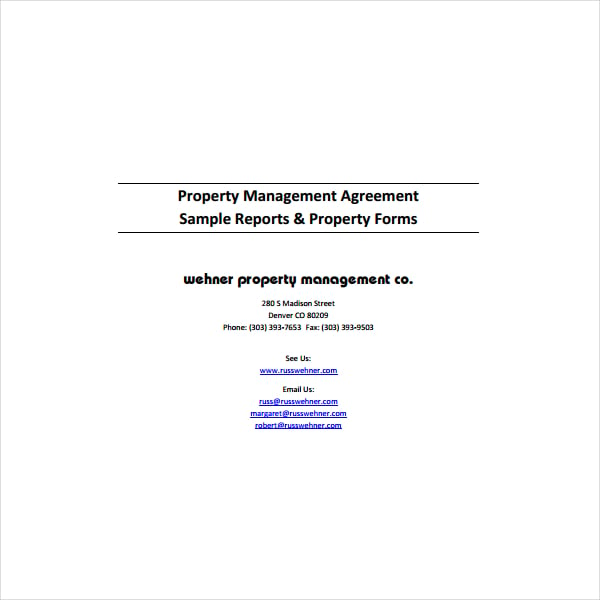
russwehner.com
Property managers are hired to manage the properties of a business owner. But sometimes, they may be hired or not. It may be expensive for you or you want to manage the property on your own instead of relying on another person. There are some factors to it that need to be considered before you hire a property manager.
Determine if you have enough money to pay for another person in getting the job done. It all starts with the cost. Think carefully about this part since it involves people and money. If you can afford to pay for a property manager, then go for it. You really have to screen the applicants who are competent for the job. It will be a waste of money to pay for someone who does not do the job well. If not, better manage the property on your own. It spares you from the hassle and possible issues with the people that you would have hired. You may also see agreement templates in a word.
If you live near your property, you could manage it by yourself. However, it’s a different story if you live far from your property. You would really end up hiring someone to manage them. It will be helpful in dealing with issues that you can’t handle from where you are. Just make sure the manager reports everything to you honestly. Communication between the two of you should always be coordinated and constant. You may also see construction agreement templates.
If hands-on management does not suit you, it would be better to hire a property manager. This gives you more time to search for more properties to acquire and make your small business grow. Some business owners are the type of people who leave the management job to others while he finds something to add up to his business. They view their properties as an investment. You can still intervene with the management process once in a while and check if everything is doing fine.
Leave the managing job in the manager’s hands if you only have limited time to devote to your business. If you want to grow your business, even more, hiring managers to manage your property is a good expense. This reduces your tasks as you search for more properties, as long as you have the money to pay for them. Hiring managers also apply when you have so many properties and you want to be less involved in the managing process.
As your simple business grows, so is the pressure and the amount of tasks that you have to do to keep the business afloat. You tend to be swamped with all the things that you have to do. Hiring a property manager enables you to share the tasks with them. You need some time to rest while the job is being done. It also gives you the help you need.
Finding someone to manage your property is not easy. You have to find one who fits all the requirements that you set. It is the property that’s at stake, and you have spent a huge amount of money acquiring it. Here are the ways in getting a property manager.
Referrals are the best way to getting good property managers. This tells you who are the best people in this field and how they do their jobs. The managers that you hear about have built a credible track record that convinces you to hire them. After making a shortlist of managers to hire, conduct an interview with each of them. You may also like asset agreement templates.
In the interview and screening process, take note of the applicant’s track record and your first impression of them. Think if this person is worthy to be given the task of managing your property. You should let your judgment rule in this area. Also, take note of his personal and track records so you can see if he will be able to perform well. Take a careful look if they are well-spoken and put together. Putting yourself in the tenant’s place will also help if this person is worthy of trust if you want to rent a property. You may also like development agreement templates.
And with this work, it includes the length of time for him to place a tenant on your property, handling vacancies, advertising in newspapers, websites, and establishments, and their method of doing it, and the way he advertises vacant homes. Take note of these essentials as these are important in the competency of a property manager.
If you have finally decided who to hire for the job, it’s time to iron out the contract. Get into the details and agree on what’s good for both of you. After reaching the final agreement, put in your signature and start the job as soon as possible. You may also like concession agreement templates.
Hiring property managers give more good things than bad in your business. Just know when to hire one so you won’t waste time and money on the wrong people. Have a clear sense of mind when picking the people to get the job done. You may also like free agreement templates.

Legally mandatory documents that are required to be signed by both the parties are the simple rental agreement templates. These…

A purchase and sale agreement is a compulsory legal document to have when a buyer and seller are entering into…
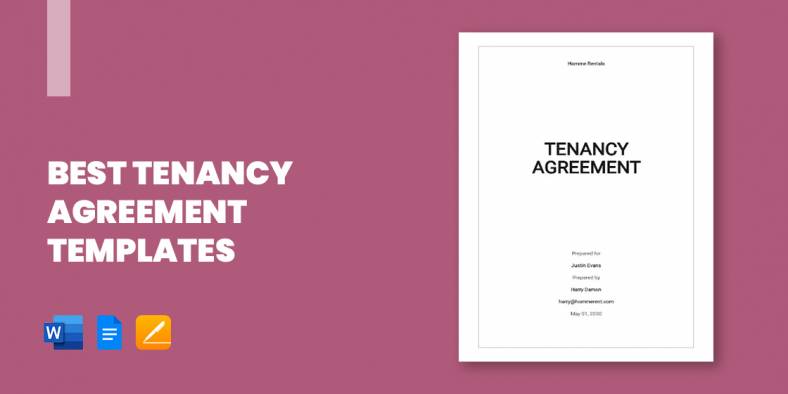
Living alone or with a family has enormous risks, and the responsibilities can be complicated to manage. Become a good…

Discovering and verifying the top ability is no simple undertaking. It requires a profound comprehension of the organization’s culture and…
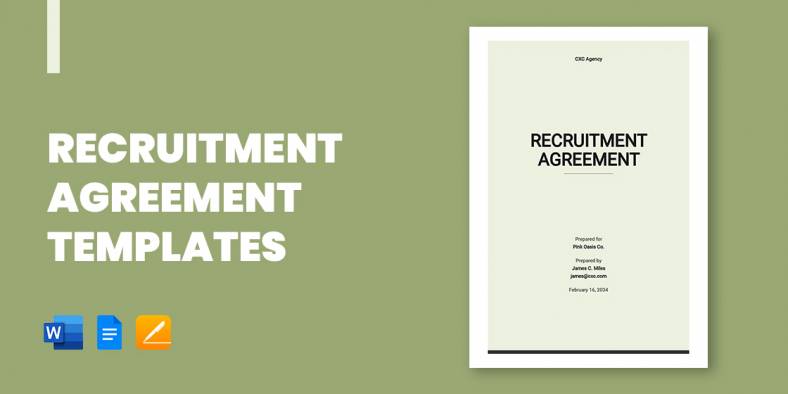
An agreement that occurs between two parties where one party (the recruiter or recruiting firm) is appointed by the other…

During the 1848 revolutions in Europe, the term “logistics” played a crucial role in transferring goods, equipment, and military personnel.…

The recruitment services agreement is provided by the recruitment agencies. And, that acts as the middleman or the middle-party between…
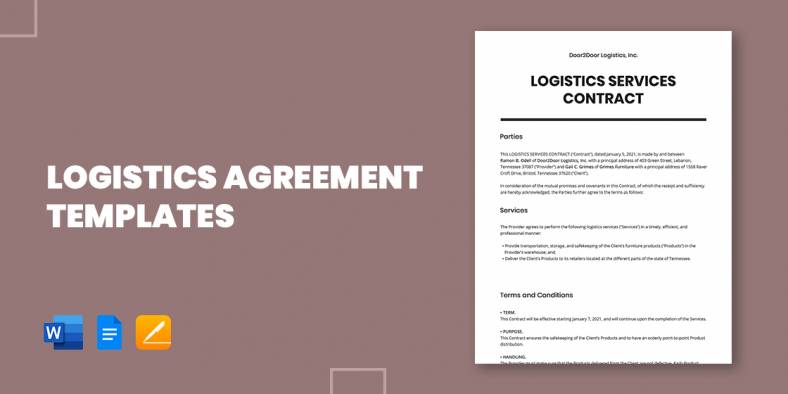
Many projects among businesses involve heavy management and great plans sample that logistics will be relevant. Operations involve proper organization…
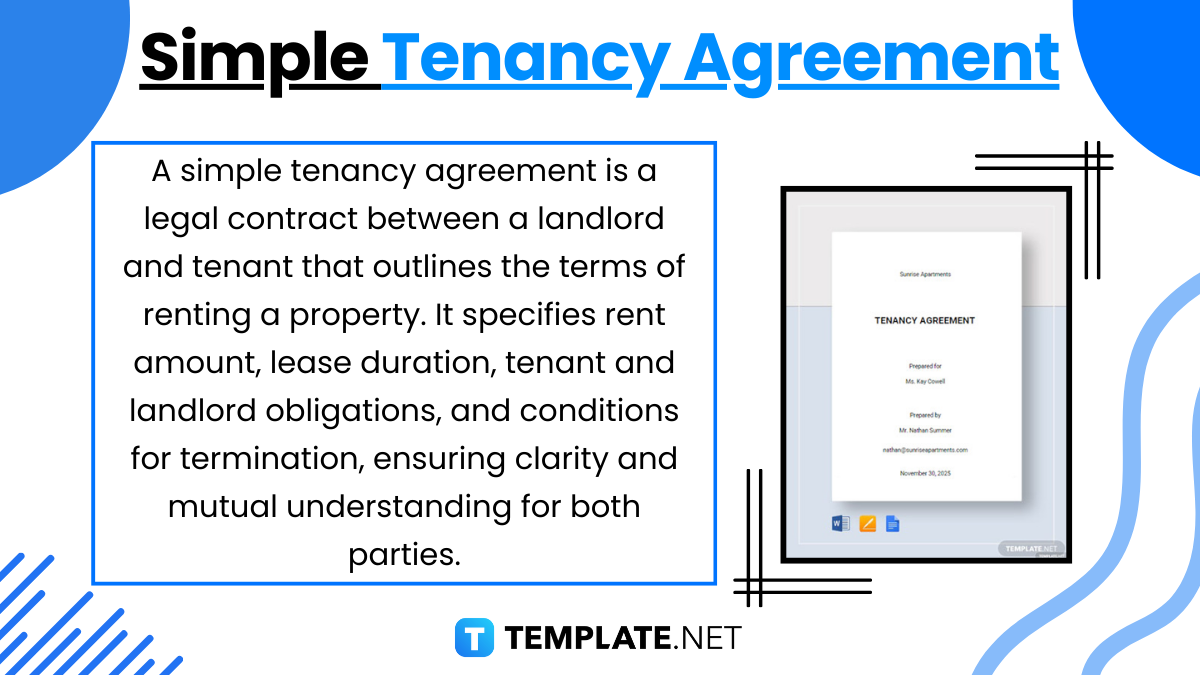
A simple tenancy agreement is a legally binding document that outlines the terms and conditions between a landlord and a…